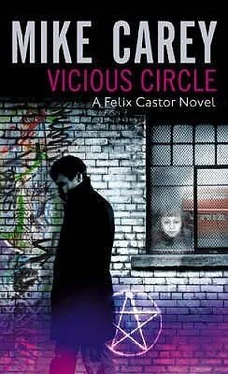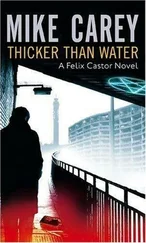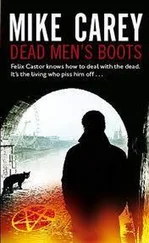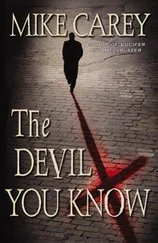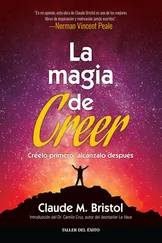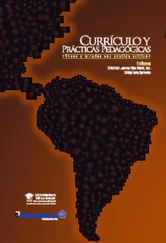Vicious Circle
(The second book in the Felix Castor series)
A novel by Mike Carey
Alphabetically, to Ben, Davey and Lou;
chronologically, to Lou, Davey and Ben.
They won’t stay where I put them anyway,
thank God, so either way is fine.
May the world be good enough for them.
The usual suspects helped out even more this time around. Darren, Meg, George, Gabby, Nick, Bella – thank you so much. Thanks to Ade, too, for introducing me to so many bits and pieces of London I barely knew, as well as for providing so much of this novel’s soundtrack. And thanks always to Lin for being there whenever I needed her, and managing to keep me on the tracks without letting me turn into a train.
The incense stick burned with an orange flame and smelled of Cannabis sativa . In Southern Africa it grows wild: you can walk through fields of it, waist-high, the five-fronded leaves caressing you like little hands. But in London, where I live, it’s mostly encountered in the form of compacted black lumps of soft, flaky resin. A lot of the magic’s gone by then.
Detective Sergeant Gary Coldwood gave me a downright hostile look through the tendrils of the smoke, which curled lazily up through the cavernous interior of the warehouse, the sweet smell dissipating along the aisles of sour dust. The warehouse was on the Edgware Road, on the ragged hinterlands of an old industrial estate: judging from the smashed windows outside and the rows and rows of empty shelves inside, it had been abandoned for a good few years – but Coldwood had invited me to join him and a few uniformed friends for a legally authorised search, so it was a fair bet that appearances were deceptive.
‘Have you finished arsing around, Castor?’ he asked, fanning the smoke irritably away from his face. I don’t know if all this tact and diplomacy is something he was born with or if he just learned it at cop school.
I nodded distantly. ‘Almost,’ I said. ‘I have to intone the mantra another dozen or so times.’
Well, Jesus, you know? It was Saturday night, and I already had a heap of my own shit to cope with. When the Met calls, I answer, because they pay on the nose, but that doesn’t mean I have to like it. And anyway, I figure that if you give them a little showmanship they’ll be more impressed when you come up with the goods. Look, boys, I say in my own devious way, this is magic: it has to be, because it’s got smoke and mirrors. So far, Coldwood’s the only cop who’s ever called me on it, and that’s probably why we get along so well: I respect a man who can smell the bullshit through the incense.
But tonight he was in a bad mood. He hadn’t found a dead body in the warehouse, and that meant he didn’t know what he was dealing with just yet. Could be a murder, could just be their man doing a runner: and if it was a murder, that could be either a golden opportunity or six months of covert surveillance going up in aromatic smoke. So he wanted answers, and that made him less than usually tolerant of my sense of theatre.
I murmured a few variations on om mane padme om , and he kicked the heel of my shoe resonantly with his Met-issue heavy-duty policeman’s boot. I was sitting on the floor in front of him with my knees drawn up, so I suppose it could have been worse.
‘Just tell me if you can see anything, Castor,’ he suggested. ‘Then you can hum away to your heart’s content.’
I got up, slowly: slowly enough for Coldwood to lose patience and wander across to see if the forensics boys had managed to shag any prints from a battered-looking desk in the far corner of the room. He really wasn’t happy: I could tell by the way his angular face – reminiscent of Dick Tracey, if Dick Tracey’d had joined-up eyebrows and a skin problem – had subsided onto his lower lip, forcing it out into a truculent shelf. His body language was a bit of a give-away, too: whenever he finished waving and pointing, which he does when he gives orders, his right hand fell to the discreet shoulder holster he wore under his tan leather jacket, as if to check that it was still there. Coldwood hadn’t been an armed response unit for very long, and you could tell the novelty hadn’t worn off yet.
I ambled across the warehouse towards the door I’d come in through, away from the forensics team, watched curiously by two or three poor-bloody-infantry constables who were there to maintain a perimeter. Coldwood knows my tricks, and makes allowances for them, but to these guys I was obviously something of a sideshow. Ignoring them, I looked behind the filing cabinets that were ranged along the wall to the right of the door, banged on the cork noticeboard behind them, which had sheaves of dusty old invoices clinging to it like mangy fur, and turned the girlie calendars over to look at the bits of grey-painted breeze-block they were covering. Disappointingly, there was nothing there. No hidden doors, no wall-mounted safes: not even old graffiti.
I looked down at my feet. The floor of the warehouse was bare grey cement, but just here by the noticeboard and the filing cabinets there was a ragged rectangle of red linoleum – a psychedelic sunburst pattern, very retro-chic unless it had been there since the 1970s. I’d noticed another piece, with the same pattern, underneath the desk. Here, though, there were scuff marks in the dust where the lino had been moved in the recent past. I kicked down experimentally with my heel. There was a slightly hollow boom from underneath my feet.
‘Coldwood?’ I called over my shoulder.
He must have caught something in my voice – or else he’d heard the hollow note, too – because he was suddenly there at my elbow. ‘What?’ he asked suspiciously.
I pointed down at the lino. ‘Something here,’ I said. ‘Does this place have a cellar?’
Coldwood’s eyes narrowed slightly. ‘Not according to the plans,’ he said. He beckoned to two of the plods and they came over at a half-run. ‘Get this up,’ he told them, gesturing at the lino.
They had to move the filing cabinets first, and since the cabinets were full they took a bit of manhandling. I could have helped, but I didn’t want to get into an argument about demarcation. The linoleum itself rolled up as easy as shelling peas, though, and Coldwood swore under his breath when he saw the trapdoor underneath. It was obviously something he felt his boys should have spotted first.
It was about five feet square, and it lay exactly flush with the floor on three sides. On the fourth side, the hinges were sunk a centimetre or so into the surface, but it was a professional job with the narrowest of joins so no telltale lines would be trodden into the lino above. There was a keyhole on the left-hand side: a lozenge-shaped keyhole with no widening at the shank end, so this was most likely a Sargent and Greenleaf mortice – not an easy nut to crack.
Coldwood didn’t even bother to try: he sent two of the uniforms off to get some crowbars. With a great deal of manoeuvring, a few false starts, and a hail of splinters as the wood screamed and split, they finally succeeded in levering the entire lock plate out of its housing. Even then the bolt could scarcely be made to bend. The plate stood out of the trapdoor at a thirty-degree angle, rough star-shapes of broken wood still gripped by its corner screws: a wounded sentry who’d been sidestepped rather than defeated. Now that their moment in the spotlight was over, the plods stood back deferentially so that the sergeant could open the trapdoor himself. Coldwood did so, with a grunt of effort because the wood of the trap turned out to be a good inch thick.
Inside, there was a space about a foot deep, separated by three vertical plywood dividers into four compartments of roughly equal size. Three of the compartments were filled with identical brown-paper bags, about the size of Tate and Lyle sugar bags, all double-wrapped in plastic on top of the paper: the fourth was mostly full of black DVD sleeves, but two small notebooks with slightly oil-stained covers were sitting off in one corner. On the cover of the top one, written in thick black felt-tip capitals, were the two words GOODS IN. What the other said I couldn’t tell.
Читать дальше
